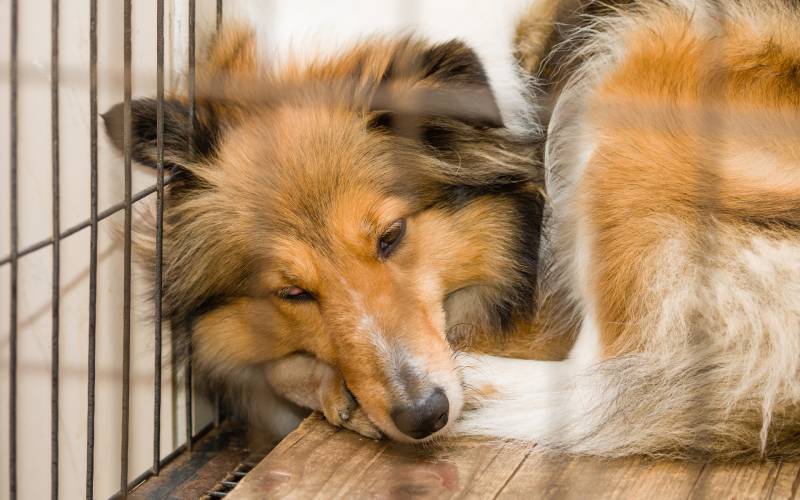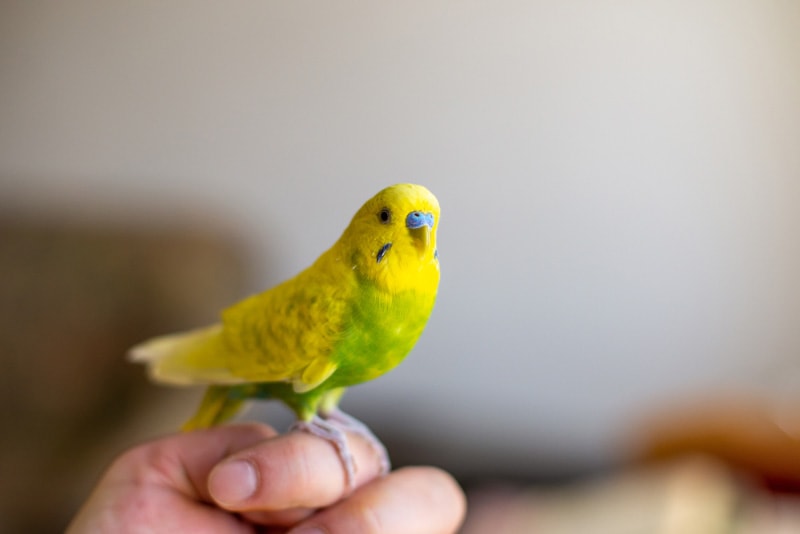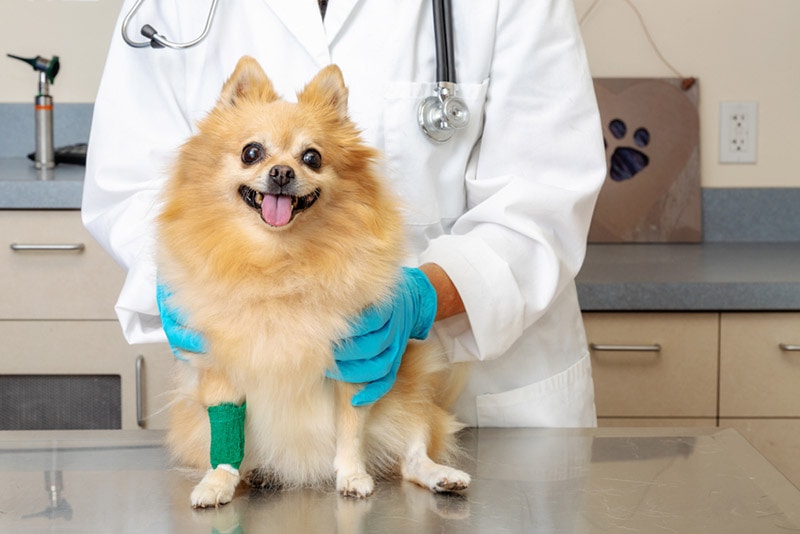Why Is My Dog Coughing: 7 Typical Reasons (Vet Answer)

Updated on

Coughing in a dog can be a sudden problem or a chronic problem that must be managed over the long term.
The first step in diagnosing and treating a cough is making sure that it is actually a cough since many conditions can look like coughing, such as reverse sneezing or retching. It can be confusing to distinguish a true cough from a sneeze, retching, or reverse sneezing. If you are unsure, it may be worth taking a video so that you and your vet can talk about the same clinical signs.
Once you know that your dog is indeed coughing, this article can help you understand the reasons dogs cough.
The 7 Common Reasons Your Dog Is Coughing
1. Upper Respiratory Infection
Inflammation in the upper respiratory tract, particularly in the sinuses, can cause coughing. The inflammation is often associated with mucous and discharge that trickles down the back of the throat, causing a cough.
Inflammation of the sinuses can be caused by infection, but it can also be caused by chronic irritation. Allergies in dogs don’t usually cause sinus irritation in dogs the same way they do in humans, however. So, other sources of inflammation, such as cysts or tumors, may need to be investigated. Signs of upper respiratory tract infection are as follows:
- Nasal discharge
- Sneezing
- Coughing
- Red and discharging eyes

2. Tracheal Problems
The trachea is the part of the respiratory tract that travels from the mouth to the lungs. Problems in the trachea can cause a cough.
Inflammation from infection or chronic irritation can cause a cough. Things stuck in the trachea can also cause a cough, for example, if a dog is choking. But tumors and scar tissue can also be problematic.
And in some dogs, particularly small dogs, the trachea is so small and flimsy that it can collapse in on itself. This often results in a reverse sneeze, which is not quite a cough but can be confused with a cough. However, this condition, if severe enough, can trigger chronic irritation, which can then lead to a cough—reverse sneezing and coughing together. Here are the signs of a tracheal cough:
- Sudden coughing
- Unresolving cough
- Hacking cough
3. Laryngeal Inflammation or Paralysis
The larynx is a complex part of the throat that involves breathing, swallowing, and vocalizing (barking, whining, or growling). It can get inflamed and have problems that can cause a cough.
In some dogs, it can even become partially or entirely paralyzed, causing a cough and changes in their voice. Here are some signs of laryngeal cough:
- Change in voice
- Pain swallowing
- Cough
- Loud breathing or a change in the sound of their breath

4. Bronchitis
Bronchitis is inflammation in the upper part of the lungs. In dogs, it can become a chronic and reoccurring problem even without infection. Dogs who are prone to bronchitis tend to have a chronic cough that needs to be managed continuously.
Infection can cause bronchitis, but it can also be a non-infectious problem that still needs medical treatment for it to improve. Be aware of these signs of bronchitis:
- Acute or chronic cough
- Exercise intolerance
- Heat intolerance
5. Pneumonia
Pneumonia is inflammation of the lower lungs (compared to bronchitis), and it can be deadly. It causes a cough with its inflammation and lung fluid. It is often caused by infection, bacterial or viral, but it can also be triggered when something gets stuck in the lungs. In this case, it is called aspiration pneumonia. These are the signs of pneumonia:
- Cough
- Lethargy
- Inappetence
- Struggling to breath
- Fever

6. Heartworms
Heartworm infects the blood vessels between the heart and the lungs. As a result, it can cause a cough by causing inflammation and fluid in the lungs. Heartworm is spread by mosquito bites. It is easily preventable by monthly tablets or yearly injections, but it is difficult and consuming to treat. Watch out for these signs of heartworm:
- Cough
- Exercise intolerance
- Labored breathing
- Slow growth
7. Heart Disease
Heart disease can be caused by many things that go wrong with the complex organ: the heart. However, in some cases, even though it is not part of the respiratory tract, heart disease can cause a dog to cough.
The cough develops as fluid accumulates in the lungs because the blood is not pumped through the lungs fast or strong enough by the weak, diseased heart. The accumulation of fluid makes it difficult to breathe properly, so the dog coughs. These are some signs of heart disease:
- Dry, hacking cough
- Heart murmur
- Lethargy
- Exercise intolerance
- Collapse

Final Thoughts
Coughing in dogs can be caused by many different problems with the respiratory tract, from common infections like kennel cough or canine influenza to less common physical problems such as laryngeal paralysis. And sometimes, other systems can affect the respiratory system resulting in a cough, such as the heart.
Getting to know when your dog is coughing, sneezing, or otherwise snuffling around is the first important step in recognizing disease in the respiratory system and distinguishing a cough. While they can be common and minor health problems, a coughing dog often needs more medical attention than expected.
Featured Image Credit to: Igor Normann, Shutterstock













